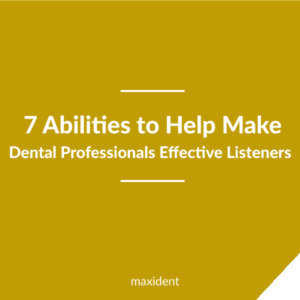
One of the most important qualities of an excellent dental professional is their ability to communicate effectively with their patients. According to Dentistry IQ, “roughly 85% of case acceptance stems from a dentist’s ability to relate to his or her patients, while just 15% is due to technical proficiency.” Relating to patients requires being an effective listener and communicator so, provided below, are seven abilities to consider.
- Ability to stop talking
The trademark of an effective listener and communicator is the ability to let the other person speak. You can’t relate or empathize with your patient if you are too busy talking over them.
- Ability to put an anxious patient at ease
You want your patient to feel free to say anything. If they are upset, let them vent. It is important that you practice active listening by nodding, gesturing or even using encouraging words so they will continue. You also want to maintain eye-contact without staring in order to show you understand exactly what is being said.
- Ability to be prepared to listen
Preparing yourself to listen means putting all mental distractions aside. You don’t want to be thinking about something else while your patient is talking. It is important to concentrate on the message being communicated and not what’s going on in your own life.
- Ability to remove all distractions
Not only is it important to clear your mind of random thoughts when practicing effective listening, but it is just as important to remove all physical distractions as well. Avoid unnecessary disruptions and looking bored or distracted with nonverbal cues such as doodling or looking out the window.
- Ability to empathize
To empathize is to relate to your patient on a personal level and make them understand that you know what they’re going through. Keep your mind open to different ideas and views and don’t let your own ideas and views get in the way. You want to understand your patient’s point-of-view without judgement.
- Ability to avoid biases
Psychological distractions can be just as bad or even worse than the physical or mental ones. Be aware of those listening roadblocks such as thinking you’re right or that you have to provide help right away, or waiting for gaps or pauses to jump in with a response.
- Ability to be attentive to nonverbal communication
Nonverbal communication is utilized a lot more than verbal communication. Not only is nonverbal communication gestures and body language, but it is also tone of voice, volume, and inflection. To understand the full meaning of what your patient is saying, you need to be attentive to these cues. Just remember that sometimes a patient’s actions will speak louder than their words, but only if you’re paying attention.
Sources
- http://www.dentistryiq.com/articles/2015/07/communicating-trust-the-key-to-dental-case-acceptance.html?cmpid=Enl_TIPS_and_TRICKS_July-14-2015&sponsored=topic3
- Customer Service Sixth Edition: Skills for Success, Robert W. Lucas, McGraw Hill, 2015.
- http://www.skillsyouneed.com/ips/listening-skills.html
Suggested Page



